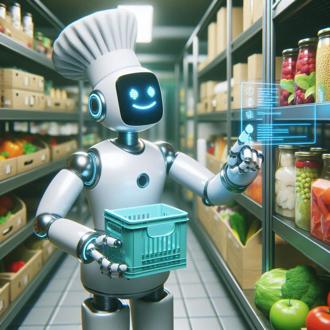The Future of Food Inventory: How Smart Systems are Revolutionizing Restaurants and Beyond
Thursday, 25 July,2024
Introduction:
In today's ever-evolving world, technology is constantly pushing boundaries and transforming industries. Smart Food Inventory Management Systems are a revolutionary concept with the potential to significantly reduce food waste,streamline operations, and boost profitability for restaurants, cafes, and food retailers. This blog post dives deep into this innovative technology, exploring its functionalities, benefits, and real-world applications.
AI Food Inventory Management System
What is a Smart Food Inventory Management System?
A Smart Food Inventory Management System can be defined as a technology-driven solution that optimizes inventory tracking and management in the food industry. It works by leveraging a combination of advanced sensors, Internet of Things (IoT) devices, and data analytics to provide real-time insights into stock levels, expiration dates, and ordering needs. Imagine having a system that automatically updates your inventory as ingredients are used, alerts you to potential spoilage, and even suggests optimal order quantities based on past sales data.
Use Cases and Industry Applications:
Smart Food Inventory Management Systems transcend industries and offer a multitude of use cases. Here are some prominent examples:
- Restaurants: By implementing smart shelf sensors and RFID tags, restaurants can gain real-time visibility into ingredient levels, preventing stockouts and overstocking. Predictive analytics can anticipate demand fluctuations,ensuring they have the right amount of ingredients on hand during peak hours. This can lead to significant improvements in inventory control, reduced food waste, and improved customer satisfaction.
- Grocery Stores: Smart systems can be used to monitor fresh produce storage conditions and ensure optimal temperature and humidity levels. This not only extends the shelf life of fruits and vegetables but also minimizes shrinkage and waste. Additionally, automated ordering based on real-time sales data can optimize stock levels and reduce the need for manual inventory management.
- Foodservice Providers: Catering companies and foodservice providers can leverage smart inventory systems to streamline operations and ensure efficient delivery of fresh ingredients. Real-time tracking of stock allows them to manage deliveries seamlessly and minimize the risk of spoilage during transportation. This approach enables them to offer better service to clients and reduce overall operational costs.
Benefits:
Smart Food Inventory Management Systems offer a compelling set of advantages that can revolutionize how businesses in the food industry operate:
- Cost Savings: Studies show that Smart Food Inventory Management Systems can generate cost savings of up to 20% by minimizing food waste, optimizing ordering processes, and reducing manual labor requirements. For instance, a restaurant using a smart system for inventory management reported a reduction in food waste costs by $5,000 per month.
- Efficiency Improvements: Smart systems automate tedious tasks like stock checks and order generation, leading to significant efficiency gains. A study by The National Restaurant Association revealed that Smart Food Inventory Management Systems can increase operational efficiency by up to 15%.
- Quality Enhancements: By providing real-time insights into ingredient freshness and storage conditions, Smart Systems ensure better quality control throughout the food supply chain. For example, grocery stores that have implemented smart inventory systems have reported a decrease in spoilage rates by up to 30%.
By embracing Smart Food Inventory Management Systems, businesses in the food industry can gain a significant competitive edge. With real-time data, automation, and insightful analytics at their fingertips, they can optimize stock levels, minimize waste, improve operational efficiency, and ultimately, boost profitability and ensure a more sustainable food supply chain.
